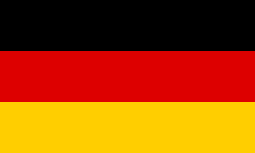Nazi flag
 |
|
| Name | Bundesflagge und Handelsflagge |
|---|---|
| Use |
Civil and state flag, civil ensign |
| Proportion | 3:5 |
| Adopted | 23 May 1949 |
| Design | A horizontal tricolour of black, red, and gold. |

Variant flag of Federal Republic of Germany
|
|
| Name | Bundesdienstflagge und Dienstflagge der Landstreitkräfte der Bundeswehr |
| Use |
State flag and ensign, war flag |
| Proportion | 3:5 |
| Adopted | 7 June 1950 |

Variant flag of Federal Republic of Germany
|
|
| Name | Dienstflagge der Seestreitkräfte der Bundeswehr |
| Use |
Naval ensign |
| Proportion | 3:5 |
| Adopted | 9 May 1956 |
The flag of Germany is a tricolour consisting of three equal horizontal bands displaying the national colours of Germany: black, red, and gold. The flag was first adopted as the national flag of modern Germany in 1919, during the Weimar Republic.
Germany has two competing traditions of national colours, black-red-gold and black-white-red, which have played an important role in the . The black-red-gold tricolour first appeared in the early 19th century and achieved prominence during the 1848 Revolutions. The short-lived Frankfurt Parliament of 1848–1850 proposed the tricolour as a flag for a united and democratic German state. With the formation of the Weimar Republic after World War I, the tricolour was adopted as the national flag of Germany. Following World War II, the tricolour was designated as the flag of both West and East Germany in 1949. The two flags were identical until 1959, when the East German flag was augmented with the coat of arms of East Germany. Since reunification on 3 October 1990, the black-red-gold tricolour has become the flag of reunified Germany.
After the Austro-Prussian War in 1866, the Prussian-dominated North German Confederation adopted a tricolour of black-white-red as its flag. This flag later became the flag of the German Empire, formed following the unification of Germany in 1871, and was used until 1918. Black, white, and red were reintroduced as the German national colours with the establishment of Nazi Germany in 1933, replacing German republican colours with imperial colours until the end of World War II.
...
Wikipedia
